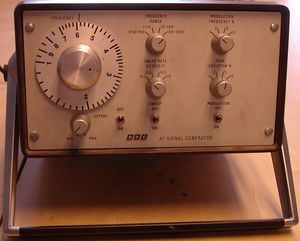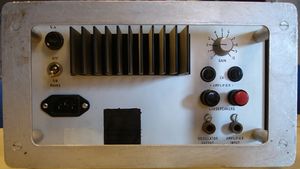Equipment/BBC AF signal generator: Difference between revisions
No edit summary |
(moved downstairs) |
||
| (16 intermediate revisions by 6 users not shown) | |||
| Line 1: | Line 1: | ||
{{EquipmentInfobox | |||
|name=BBC sig-gen <!-- Name of the item. --> | |||
|image=BBC_AF_signal_generator_front.jpg <!-- Image of the item. Leave with placeholder image if none exists. --> | |||
|model=Unknown <!-- Model --> | |||
|category=Equipment <!-- Main category. Please leave alone to keep item in this category --> | |||
|subcat=Test equipment <!-- Sub-category if one exists. Please check main listing to see other categories contained within the main one --> | |||
|status=Unknown <!-- Set to one of; Good working order, Faulty, Out of order, Under construction, Out of consumables, Scrapped, or Unknown --> | |||
|consumables=Unknown <!-- Any items used up in normal operation, such as; ink, paper, saw-blades, cutting disks, oil, etc.. --> | |||
|accessories=Unknown <!-- Any items associated with the equipment but not consumable, such as; drill bits, safety gloves, goggles, etc.. --> | |||
|reqtraining=<!-- Is training required to use this equipment? Yes or no. --> | |||
|trainlink=Unknown <!-- If training is required, provide a link to training signup or contact page. Otherwise leave blank. --> | |||
|acnode=Unknown <!-- Is the equipment ACnode locked? --> | |||
|owner=Russ <!-- Provide a link to owners members page if other than LHS --> | |||
|origin=On-loan<!-- If via pledge, please link to the completed pledge page on the wiki --> | |||
|location=Ground Floor Electronics Lab<!-- Floor, room/zone and location within that area --> | |||
|maintainers=<!-- If someone is nominated as managing the upkeep of this item, please list them here. No links please; it currently breaks the template. --> | |||
|template_ver=1.1 <!-- Please do not change. Used for tracking out-of-date templates --> | |||
}} | |||
BBC AF signal generator | BBC AF signal generator | ||
This belongs to Russ. You can use it but Russ will be grumpy if it gets damaged. | |||
== History == | |||
This unit was made sometime around 1989 and looks like it was built from modules from the RS catalogue. Russ purchased it from an auction of old BBC equipment. | |||
Quickstart | == Quickstart == | ||
To produce an audio tone: | To produce an audio tone: | ||
Connect a small loudspeaker to the binding posts at rear | Connect a small loudspeaker to the binding posts at rear | ||
| Line 72: | Line 96: | ||
'''Amplifier fuses''' | '''Amplifier fuses''' | ||
One 20mm 2amp T for each of the + 45v and -45v rails of the amplifier supply | One 20mm 2amp T for each of the + 45v and -45v rails of the amplifier supply | ||
| Line 79: | Line 101: | ||
'''Oscillator Output''' | '''Oscillator Output''' | ||
PO Jack socket | PO Jack socket Sleeve = Chassis Ring = ? Tip = ? | ||
'''Amplifier Input''' | '''Amplifier Input ''' | ||
PO Jack socket | PO Jack socket Sleeve = Chassis Ring = ? Tip = ? | ||
'''Loudspeaker Output''' | '''Loudspeaker Output''' | ||
Two binding posts | Two binding posts carry the output from the ILP amplifier module. Output power not known but should be good for 20 watts into 8/16 ohms. | ||
== Operating Notes == | |||
The frequency control feels very loose, this is normal and does not mean that anything is broken.... | |||
(More notes to follow when the precise Modus Operandi has been established) | |||
The 100-100K range seems most usefull, other ranges seem to be mostly below what little loudspeakers can produce. | |||
[[File:BBC_AF_signal_generator_rear.jpg|thumb|siggen rear panel]] | |||
== Log. == | |||
Please add any observations or repairs here... | |||
June 2011. Someone reported it not working, supposedly one of the fuses on the back was blown and blew again when replaced. | |||
The two fuses on the right hand of the rear panel supply +45volts and -45volts to the amplifier module. The +ve fuse was ok and is a 2amp T fuse. A 250mA fastblow fuse had been fitted in the other holder. Seems fine with a 2amp T fuse. | |||
May 2012 There are now two leads tied to the back each with a PO jack plug and free ends. Use these to connect to the osc o/p or amp i/p. | |||
Shield = sleeve | |||
Red = ring | |||
White = tip | |||
[[Category:Equipment/Electronics]] | |||
[[Category:Equipment]] | |||
[[ | |||
Latest revision as of 18:22, 8 December 2019
BBC AF signal generator
This belongs to Russ. You can use it but Russ will be grumpy if it gets damaged.
History
This unit was made sometime around 1989 and looks like it was built from modules from the RS catalogue. Russ purchased it from an auction of old BBC equipment.
Quickstart
To produce an audio tone: Connect a small loudspeaker to the binding posts at rear Select 100-100K range Frequency dial at 6 gives roughly middle C (720Hz). Gain knob on rear at 2 Front output knob up 20 degrees Sweep off Modulation off. Rear on/off switch on Front on/off switch on Tone should be heard in the loudspeaker.
Beware This unit has a built in amplifier. The loudspeaker terminals on the back can produce up to 40 volts peak to peak and a lot more current than a typical 600ohm signal generator output. You can blow up things like computer audio inputs!
Controls
Front Panel
Frequency This is a three turn potentiometer, the markings on the dial bear little relationship to the output frequency but the control is smooth and noise free.
Frequency Range Four ranges, 0.1Hz-100Hz, 1Hz-1kHz, 10Hz-10kHz and 100Hz-100kHz.
Output Level Adjusts level at PO jack at rear and drive to amplifier.
Output On/Off
Sweep Rate Four sweep speeds, 0.1,0.2, 0.5 and 1 octave/sec.
Sweep On/Off Starts a single sweep from the current setting of the Frequency Control down the scale to the low frequency of the selected range. To initiate another sweep return the switch to Off and then On again.
Modulation Frequency % Four values, 1, 2, 5 and 10%
Peak Deviation % Four values, 1,2,5 and 10%
Modulation On/Off
Rear panel
Gain Sets the gain of the amplifier module.
Supply
Mains Inlet (IEC)
Mains Fuse (5amp
Mains On/Off
Amplifier fuses One 20mm 2amp T for each of the + 45v and -45v rails of the amplifier supply
Inputs/Outputs
Oscillator Output PO Jack socket Sleeve = Chassis Ring = ? Tip = ?
Amplifier Input PO Jack socket Sleeve = Chassis Ring = ? Tip = ?
Loudspeaker Output Two binding posts carry the output from the ILP amplifier module. Output power not known but should be good for 20 watts into 8/16 ohms.
Operating Notes
The frequency control feels very loose, this is normal and does not mean that anything is broken....
(More notes to follow when the precise Modus Operandi has been established)
The 100-100K range seems most usefull, other ranges seem to be mostly below what little loudspeakers can produce.
Log.
Please add any observations or repairs here...
June 2011. Someone reported it not working, supposedly one of the fuses on the back was blown and blew again when replaced.
The two fuses on the right hand of the rear panel supply +45volts and -45volts to the amplifier module. The +ve fuse was ok and is a 2amp T fuse. A 250mA fastblow fuse had been fitted in the other holder. Seems fine with a 2amp T fuse.
May 2012 There are now two leads tied to the back each with a PO jack plug and free ends. Use these to connect to the osc o/p or amp i/p. Shield = sleeve Red = ring White = tip

